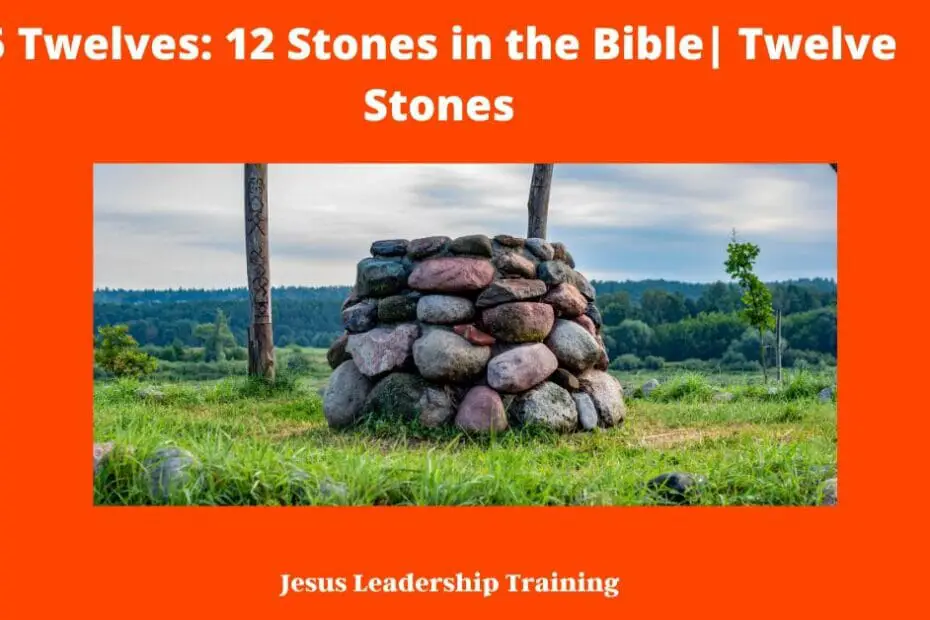There are 12 stones found in the Bible. They are mentioned in both the Old and New Testaments. While their significance is not entirely clear, they are thought to represent God’s chosen people. Here we will discuss each of these 12 stones and what they mean for believers.
Table of Contents
What are the 12 Stones mentioned in the Bible?
The 12 Stones mentioned in the Bible were stones that were gathered by the Israelites when they crossed the Jordan River into the Promised Land. The stones were placed in a pile at the base of Mount Sinai as a reminder of God’s power and provision for His people.
Each stone represented one of the 12 tribes of Israel, and the entire nation was to gather around the stones when they needed to hear from God. Today, we can still learn from these ancient stones. They remind us that God is always with us and that He is always working on our behalf. As we face our own challenges and obstacles, we can take comfort in knowing that God is with us and will help us to overcome anything that comes our way.
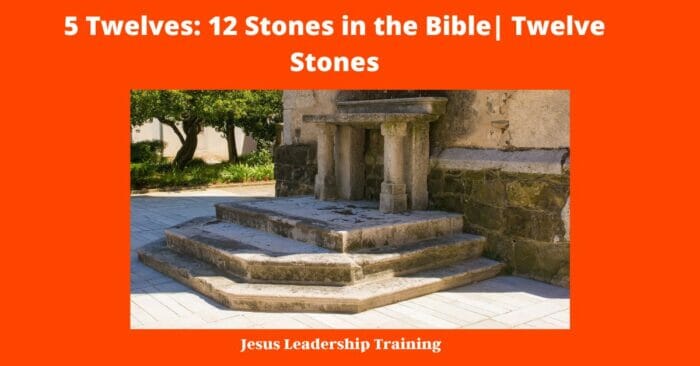
Why were Twelve Stones Gathered at the Crossing of the Jordan?
In Joshua 4:1-24, the Lord spoke to Joshua saying, “Take twelve men from the people, one from each tribe, and command them, saying, ‘Take twelve stones from here out of the midst of the Jordan, from the very place where the priests’ feet stood firm, and bring them over with you and set them down in the place where you lodge tonight.’”
So Joshua called twelve men from the tribes of Israel, one from each tribe. And Joshua said to them, “Cross over before the ark of the Lord your God into the middle of the Jordan. Each of you take up a stone on his shoulder, according to the number of the tribes of Israel. Let this be a sign among you.
When your children ask in time to come, ‘What do those stones mean to you?’ then you shall tell them that the waters of the Jordan were cut off before the ark of the covenant of Jehovah when it crossed over Jordan; these stones are to be for a memorial to the sons of Israel forever.”
So Twelve Stones were gathered as a Memorial for all time – for every generation to remember what God had done – crossing His people safely through on dry ground!
What type of Altars did God encourage Israel to make to Him?
In the bible, God encouraged Israel to make altars to Him out of natural stone that was uncut and unpolished. The stone was to be left in its natural state as a reminder to Israel that they were created by God and were His chosen people.
The Altars were also to be places where sacrifices could be made to God. The altar was to be a place of worship and communication with God. It was not to be used for any other purpose. When an altar was built, it was to be done so with great care and reverence for God.
The altar was to be a place where people could come together to worship God and offer sacrifices to Him. It was also a place where people could come to pray and seek guidance from God. Altars were an important part of Israel’s relationship with God and were a way for them to show their reverence and worship for Him.
How long did the Altar of 12 Stones that Joshua Made Last?
The Bible tells us that the Israelites were instructed by God to build an altar of twelve stones when they entered the Promised Land. This altar was to serve as a memorial of God’s faithfulness in leading them out of slavery in Egypt and into the Promised Land.
The Bible doesn’t give us an exact date for how long the altar lasted, but it does tell us that it was still standing at the time of Joshua’s death. This means that it stood for at least half a century. Given the fact that altars were typically made of durable materials like stone, it’s likely that the altar of twelve stones lasted even longer.
Whether or not it is still standing today, we can be sure that the altar served its purpose as a lasting reminder of God’s faithfulness.
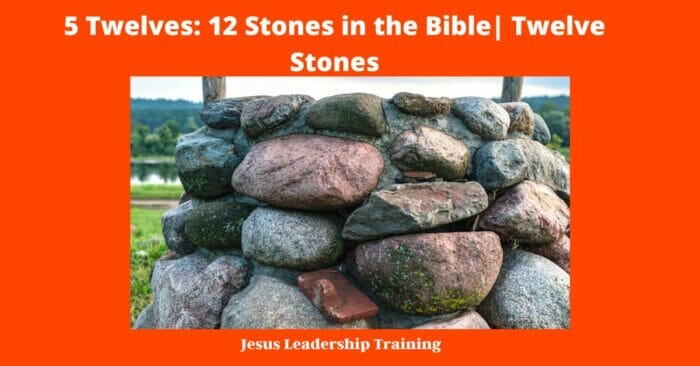
What important events happened at the Waters of the Jordan River?
The Waters of the Jordan River were the site of several important events in the Bible. Perhaps most notably, it was here that the Israelites crossed into the Promised Land after their forty years of wandering in the desert. Led by Joshua, they walked across the riverbed on dry ground while the waters were held back by a strong wind.
This miraculous event was a sign that God was with them and would help them to conquer the land. In addition, the Waters of the Jordan were also the site of Jesus’ Baptism. Here, he was publicly identified as the Messiah and began his ministry.
As such, the Jordan River holds great significance for Christians as well. It is a reminder of both God’s power and his love for humanity.
What Hope Did the 12 Stones Remind Israel Of?
The 12 stones that the Israelites took from the Jordan River and carried with them into the Promised Land were a physical reminder of God’s faithfulness. Each stone represented one of the 12 tribes of Israel, and they (stone pillars) served as a visible sign of God’s promise to protect and provide for His people.
The stones also reminded the Israelites of their own need for dependence on God. They were a daily reminder that, without God’s help, they would not be able to conquer the land or overcome their enemies. In a world that is often hostile and dangerous, the 12 stones offer a powerful reminder of the hope that we have in God.
He is faithful and will never leave us or forsake us. Whatever challenges we face in life, we can take comfort in knowing that we serve a God who is always with us and will never leave us alone.
What is the Study of Biblical Numerology?
Biblical numerology is the study of numbers in the Bible. It can involve simple arithmetic, such as adding up the number of times a certain event is mentioned, or it can be more complex, such as finding hidden meanings in numerical patterns.
While some people see biblical numerology as a way to uncover deep truths about God and His purposes for humanity, others view it as a dangerous attempt to read too much into the Bible. Whether you see it as valuable or suspect, biblical numerology is a fascinating field of study.
There are a few different ways to approach biblical numerology. One is to look for key numbers that occur throughout the Bible, such as seven (which often signifies completeness or perfection) and twelve (which is often associated with God’s chosen people, the Israelites).
Another approach is to look for numerical patterns in specific passages of Scripture. For example, some interpreters believe that the number forty-two appearing in Genesis 7:4 refers to the length of time that Noah and his family spent on the Ark during the flood.
Whether you find biblical numerology intriguing or confusing, it’s certainly worth studying. As you read the Bible, keep an eye out for numerical patterns and see what insights they might offer into God’s Word.
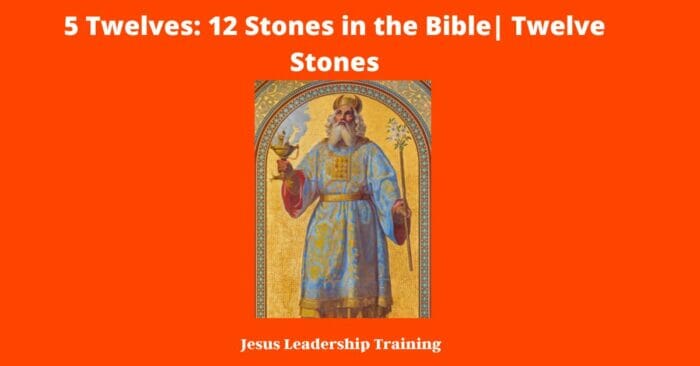
Why did Jesus choose 12 Apostles?
The number twelve is significant in the Bible. There were twelve tribes of Israel, twelve gates to the City of Jerusalem, and twelve foundation stones in the Temple. Jesus chose twelve apostles to represent these tribes, gates, and stones.
The apostles were also to be a symbol of the twelve kinds of people that make up the world. Just as there are different kinds of animals, there are different types of people. The apostle Paul wrote about this in his letter to the Corinthians. He said that each person has their own gifts and talents. In choosing twelve apostles, Jesus was saying that he wanted all types of people to follow him. He wanted rich and poor, Jews and Gentiles, men and women.
Anyone who was willing to listen to his teachings could be part of his community. The number twelve represents inclusivity and diversity. It is a reminder that Jesus came for everyone.
The twelve apostles were Simon (whom Jesus named Peter), Andrew, James, John, Philip, Bartholomew, Matthew, Thomas, James son of Alphaeus, Simon who was called the Zealot, Judas son of James, and Judas Iscariot (Luke 6:13-16).
The Bible verse is “Then he appointed twelve—designating them apostles—that they might be with him and that he might send them out to preach” (Mark 3:14).
As we can see from the verse, Jesus hand-picked his twelve closest disciples and commissioned them to go out and spread the good news of the Gospel. These twelve men were with Jesus through all his ups and downs; they experienced his miracles first-hand and were also present at his crucifixion.
Because of their intimate relationship with Jesus, they were uniquely qualified to spread the Gospel message to the farthest reaches of the world.
Today, we are all called to be apostles in our own way. As disciples of Christ, we are called to share the Good News with those around us. We may not have the same platform as the original twelve apostles did, but we can still impact our world for Christ in a powerful way. Let us remember the example of the apostles as we strive to be disciples who make a difference in our corner of the world.
What were the Names of the twelve judges of Israel
The twelve judges of Israel were:
- Othniel,
- Ehud,
- Shamgar,
- Deborah,
- Gideon,
- Tola,
- Jair,
- Jephthah,
- Ibzan,
- Elon,
- Abdon
- Samson.
These men were given the task of leading the people of Israel in the midst of their struggles against the Philistines. Each judge had his own unique story and set of challenges.
For instance, Othniel was the first judge and Ehud the second. Shamgar was the third judge and he is known for killing six hundred Philistines with an ox goad. Deborah was the fourth judge and she is known as a prophetess who led Israel to victory against an army of Canaanites.
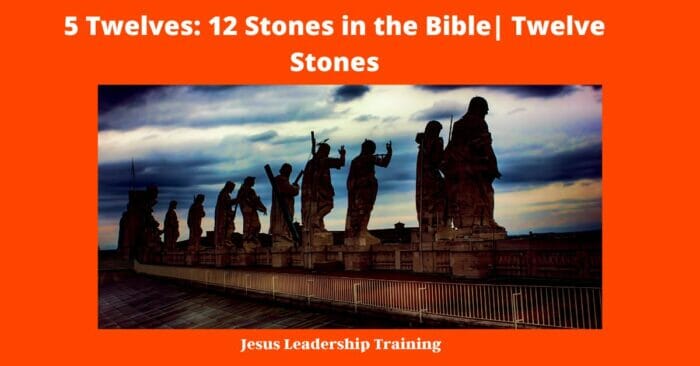
Gideon was the fifth judge and he is best known for defeating a Midianite army with only three hundred men. Tola was the sixth judge and he is known for his wisdom in adjudicating disputes between Israelites. Jair was the seventh judge and he is known for his thirty sons who rode on thirty donkeys.
Jephthah was the eighth judge and he is best known for his vow to sacrifice his daughter if God would give him victory over the Ammonites. Ibzan was the ninth judge and he is known for his sixty sons and thirty daughters. Elon was the tenth judge and he is known for his fairness in judging disputes between Israelites.
Abdon was the eleventh judge and he is known for his forty sons who rode on eighty donkeys. Samson was the twelfth and final judge of Israel and he is best known for his great strength which he used to defeat the Philistines on numerous occasions.”
What were the Names of the 12 Tribes of Israel (Names of the Sons of Israel)
The 12 tribes of Israel were originally 12 traditional families, also known as the “sons of Jacob.” These families eventually grew into large clans, and then into tribes. The names of the tribes came from the sons of Jacob, with the exception of Levi (who became the priestly tribe). The 12 sons were:
- Reuben
- Simeon
- Levi
- Judah
- Issachar
- Zebulun
- Joseph (whose sons Ephraim and Manasseh became tribes),
- Benjamin
- Dan
- Naphtali
- Gad
- Asher
The tribes settled in different parts of the Promised Land, with each tribe having its own territory. Over time, the tribal identities became more important than the family ties that had originally bound them together. Today, the 12 tribes of Israel are still a major part of Jewish identity.
How Many Precious Stones were in the High Priest’s Breastplate?
The breastplate of the high priest was a piece of ceremonial clothing that was prescribed in the book of Exodus. It was to be made of gold, and it was to have 12 stones set in it, representing the 12 tribes of Israel.
Each stone was to be inscribed with the name of one of the tribes. The breastplate was to be worn over the priest’s heart, and it was to be a reminder to God of his people. The number 12 is significant in the Bible, because it is the number of perfection.
The fact that there were 12 stones in the breastplate represented the perfect unity of the people of Israel.
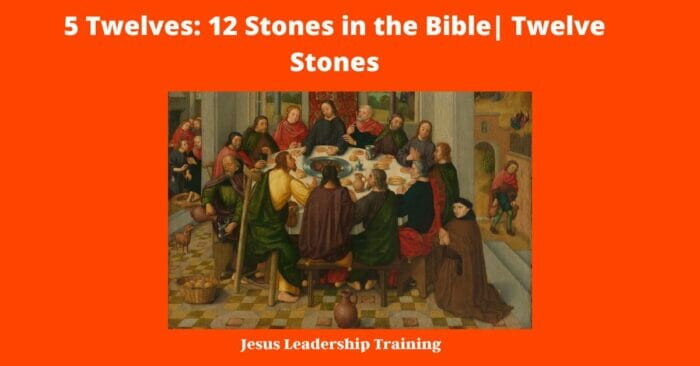
What are the 12 Stones of the Breastplate?
The 12 stones on the breastplate worn by the high priest in the Bible each represented one of the tribes of Israel. The stones were set in four rows of three, with each row containing a different type of stone.
The first row included a ruby, topaz, and emerald; the second row contained a turquoise, sapphire, and amethyst; the third row contained a diamond, jacinth, and the third agate; and the fourth row contained an emerald, fifth onyx, eighth beryl, and the ninth topaz and jasper. In total, there were 12 different kinds of stones, each representing a different tribe of the Names of Israel.
The Breastplate was symbolic of the unity of the 12 Tribes of Israel, and it was also believed to have protective powers. When worn by the high priest, it was thought to give him strength and wisdom as he carried out his duties.
Final Thoughts – What are the 12 Stones in the Bible?
In summary, the 12 stones in the Bible represent the 12 tribes of Israel. The 12 tribes were originally 12 families, who later became clans, and then tribes. Each tribe had its own territory in the Promised Land.
The 12 stones on the high priest’s breastplate represented the unity of the people of Israel. The Breastplate was symbolic of the 12 Tribes of Israel, and it was also believed to have protective powers.
The 12 stones in the Bible Altar are a reminder of the perfect unity of the people of Israel, and they are also a reminder of God’s love and care for his people. The Israelites set up this large stone, at the feet of the Priests, after they carried the ark of the Covenant of the Lord in Old Testament Times.
God Bless Greg


